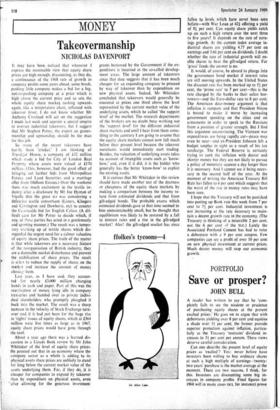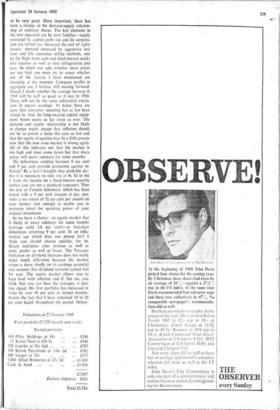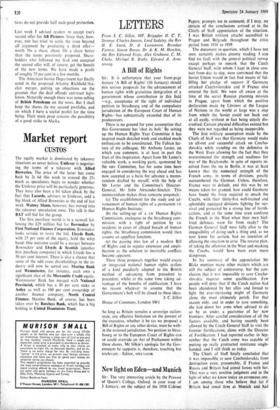Save or prosper?
PORTFOLIO JOHN BULL
A reader has written to say that he 'com- pletely fails to see the wisdom or prudence of purchasing equity shares at the present exalted prices.' He goes on to argue that with debentures yielding over 8 per cent and equities a shade over 3+ per cent, the former provide superior protection against inflation, particu- larly as the Treasury 'restrains' dividend in- creases to 31 per cent per annum. These views deserve careful consideration.
Can one describe the present level of equity prices as 'exalted'? Yes: never before have investors been willing to buy ordinary shares at such a high multiple of earnings—twenty- two years' purchase is the market average at the moment. There are two reasons, I think, for this. Investors are discounting some big in- creases in company profits. Final figures for 1968 will in many cases (ta, for instance) prove
to be very good. More important, there has been a change in the demand-supply relation-
ship of ordinary-shares. The key elements in
the new equation are by now familiar—supply restricted by capital gains tax and by corpora- tion tax (which has increased the cost of rights issues): demand increased by aggressive unit trust and life assurance selling methods, and by the flight from cash and fixed-interest stocks into equities as well as into refrigerators and cars. So when one asks whether share prices are too high one must try to assess whether any of the factors I have mentioned are changing at the moment. Company profits in aggregate are, I believe, still moving forward, though I doubt whether the average increase in 1969 will be half so good as it was in 1968. There will not be the same substantial expan- sion in export earnings. At home there are signs that consumer spending has at last been reined in. And the long-awaited capital equip- ment boom seems as far away as ever. The demand and supply relationship is not likely to change much, except that inflation should not be so potent a force this year as last and that the supply of equities may be a little greater now that•the new issue market is strong again. All of this indicates not that the market is too high and must come down but that share prices will move sideways for some months.
Do debentures yielding between 8 per cent and 9 per cent provide protection against in- flation? By a hair's breadth they probably do: but it is necessary to take tax at 8s 3d in the £ from the income on a fixed-interest security (unless you are not a standard taxpayer). Thus the new AP Cement debenture, which has been issued with a 9 per cent coupon at par, pro- vides a net return of 5-} per cent per annum on your money—just enough to enable you to maintain intact the spending power of your original investment.
So we have a choice: an equity market that is likely to move sideways for some months (average yield 3.6 per cent)—or first-class debentures returning 9 per cent. In an infla- tionary 'age which does one plump for? I think you should choose equities, for in- flation multiplies sales revenue as well as costs, profits as well as losses. The Treasury limitation on dividend increases does not really make much difference because the market values a share chiefly on its earnings potential and assumes that dividend restraint cannot last for ever. The equity market allows you to keep level with inflation and if, like me, you think that you can beat the averages, it puts you ahead. My first portfolio has increased in value by over 40 per cent in sixteen months, despite the fact that I have remained 10 to 20 per cent liquid throughout the period. Deben- Valuations at 22 January 1969 First portfolio 17.238 (details next week) Second portfolio 600 Pillar Holdings at 18s £540 15 Kaiser Steel at £36 8s £546 250 Lonrho at 56s £705 100 British Petroleum at 140s 6d £702 300 Vogler at 25s .. £375 1,000 Allied Breweries at 23s 3d .. £1,163 Cash in hand .. .. £1,916 £5,947
Deduct: expenses £163
Total £5,784 tures do not provide half such good protection.
Last week I advised readers to accept DC'S second offer for AB Pictures. Since then, how- ever, EMI has tried to settle the issue beyond all argument by producing a third offer— worth 76s a share, about lOs a share better than the terms previously proposed. Share- holders who followed my lead and accepted the second offer will, of course, get the benefit of the new terms. We have made a profit of roughly 75 per cent in a few months.
The American Justice Department has finally acted in the proposed Atlantic Richfield/Sin- clair merger, putting up objections on the grounds that the deal offends anti-trust legis- lation. Naturally enough there was some selling of British Petroleum on the news. But I shall keep the shares (in my second portfolio, and on which I have a useful profit) for the time being. Their main prop remains the possibility of a good strike in Alaska.




































 Previous page
Previous page